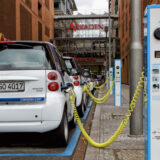
ACEA reacts to European Commission strategy on low-emission mobility
The European Automobile Manufacturers’ Association (ACEA) said it welcomes the initiative to explore how to further decarbonise transport in Europe, following the announcement by the European Commission of its strategy for low-emission mobility last week.
“The automobile industry is fully committed to continue reducing CO2 emissions across all business segments, from passenger cars to trucks,” said ACEA Secretary General Erik Jonnaert. However, he said that as the strategy “puts all the emphasis on road transport, ACEA calls for a more balanced approach, addressing all modes of transport – including air, maritime and rail.”
Technology neutrality is key to supporting innovation and thus greater fuel-efficiency, so ACEA welcomes the fact that this principle is enshrined in today’s communication, the association said.
ACEA represents the 15 Europe-based car, van, truck and bus manufacturers including BMW Group, DAF Trucks, Daimler, Fiat Chrysler Automobiles, Ford of Europe, Hyundai Motor Europe, Iveco, Jaguar Land Rover, Opel Group, PSA Group, Renault Group, Toyota Motor Europe, Volkswagen Group, Volvo Cars, and Volvo Group.
“All vehicle manufacturers will continue investing in both internal combustion engines as well as the full range of alternative powertrains that meet the demands of both private and business customers,” said Jonnaert. “As the communication rightly points out however, a wider roll-out of infrastructure for alternative fuel vehicles is needed to enable a stronger market uptake of zero- or low-emissions vehicles by 2030.”
Although the strategy discusses digital mobility, pricing and energy sources, ACEA notes that most of the binding measures proposed relate only to new vehicle technology, with insufficient focus on the other important factors that influence emissions during the use of the vehicle, such as fuels, faster fleet renewal, improving infrastructure, altering driver behavior and leveraging the potential of connected and automated vehicles.
“Focusing on new vehicle technology alone will have limited environmental benefits. A more effective approach would seek to address the full fleet and look at how these vehicles are used,” he said.
“ACEA is now looking forward to contribute constructively to the elaboration of specific proposals, in order to identify the most effective and cost-efficient ways to further reduce CO2 emissions from transport,” he added.














